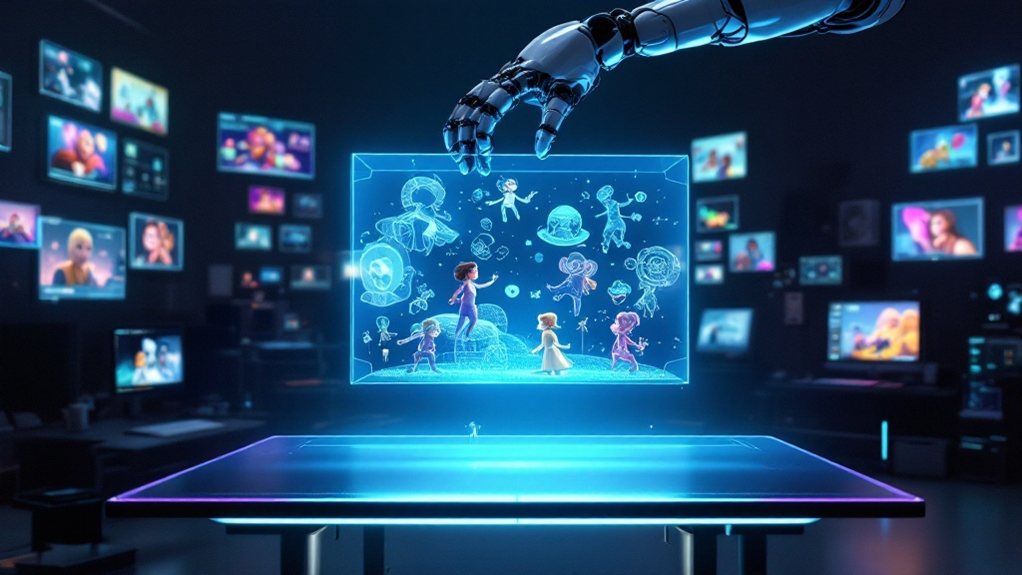Businesses are diving headfirst into AI, and it’s not just for show anymore. A whopping 55% of leaders are embracing these technologies, while global GDP could jump 7% in the next decade – thanks, robots. Companies aren’t just dipping their toes in; they’re going all-in with $1.4 trillion invested in GenAI. From chatbots working 24/7 to AI handling mundane tasks, the transformation is real. The business landscape is shifting fast, and there’s way more to this story than meets the eye.

The race for AI dominance in business is getting real. With 55% of business leaders jumping on the AI bandwagon, companies aren’t just dipping their toes in anymore – they’re diving headfirst. And why wouldn’t they? The numbers are staggering: AI is set to boost global GDP by 7% in the next decade. That’s not pocket change, folks.
AI isn’t just the next big thing – it’s already here, reshaping business and promising trillion-dollar growth across industries.
Let’s get real about why businesses are going all-in on AI. It’s simple – nobody likes doing repetitive tasks. That’s why 65% of global businesses are using AI to handle the boring stuff. SaaS companies are leading the charge, turning AI into their secret weapon for streamlining operations.
And when the market threw $1.4 trillion at GenAI models in just four months of 2023, it became crystal clear: AI isn’t just a trend, it’s the future. Management consultants are discovering that teams using AI tools produce 40% higher quality work.
The workplace is changing faster than you can say “artificial intelligence.” Chatbots are working 24/7, never asking for coffee breaks or complaining about Monday mornings. AI is transforming everything from supply chain management to retail inventory. Machine learning algorithms continuously improve performance as they process more data from connected devices. Smart retailers are implementing dynamic pricing systems to optimize their revenue and stay competitive. It’s like having a crystal ball that actually works – predicting market trends, customer needs, and even potential supply chain hiccups before they happen.
But here’s where it gets interesting. AI isn’t just about replacing humans – it’s about making them better at their jobs. While AI crunches numbers and analyzes data in real-time, employees are free to focus on work that actually requires a human brain. Think creativity, strategy, and innovation. The machines handle the mundane, while humans handle the meaningful.
The marriage of AI and automation is creating a business revolution that’s impossible to ignore. Companies are seeing fewer errors, better decision-making, and improved productivity across the board.
It’s transforming operational models, eliminating inefficiencies, and setting new standards for accuracy. And let’s be honest – in today’s competitive landscape, businesses either adapt to this new reality or risk becoming as relevant as a floppy disk in a USB world.
Frequently Asked Questions
How Much Does It Cost to Implement AI Solutions in a Small Business?
Small businesses face a wide range of AI implementation costs.
Initial investments typically run $5,000 to $30,000, covering software, hardware, and infrastructure. Monthly maintenance hits $1,000 to $5,000.
Off-the-shelf solutions are cheaper, from free to $25,000 annually. Custom AI development? That’s the expensive route – $6,000 to $100,000+.
Hidden costs like training and cybersecurity can sneak up too.
Can AI Replace Creative Jobs Like Design and Content Writing?
AI can handle basic design tasks and churn out content quickly – that’s just reality now.
Tools like Adobe Sensei and GPT are already automating entry-level creative work.
But here’s the thing: AI lacks human emotion and originality. It can’t truly understand cultural nuances or create deeply meaningful art.
While it’s great at repetitive tasks, human creatives still dominate when it comes to innovative, emotionally resonant work.
What Skills Do Employees Need to Work Alongside AI Systems?
Employees need a mix of hard and soft skills to work with AI effectively.
Technical skills like data analysis and machine learning are vital, but surprisingly, human abilities matter more. Communication, emotional intelligence, and adaptability are non-negotiable.
Problem-solving skills remain essential – because let’s face it, AI still gets confused sometimes. Critical thinking and ethical judgment? Yeah, machines can’t replace those yet.
How Long Does It Take to See ROI From AI Implementation?
ROI from AI typically becomes visible around 12 months after development starts – though some companies foolishly expect instant magic.
Every dollar invested can generate about $3.70 in returns, but timing varies wildly by industry.
Healthcare? Prepare to wait.
Simple automation? Could see results sooner.
Reality check: you need continuous monitoring and updates, or that shiny new AI system might turn into an expensive paperweight.
Are There Industry-Specific AI Solutions for Healthcare and Manufacturing Businesses?
Yes, healthcare and manufacturing have distinct AI solutions tailored to their needs.
Healthcare leverages AI for medical imaging, patient management, and drug discovery – saving lives through better diagnostics and treatment.
Manufacturing uses AI for quality control, predictive maintenance, and supply chain optimization.
Both industries benefit from automated workflows, but their AI applications are uniquely designed for industry-specific challenges and regulations.









